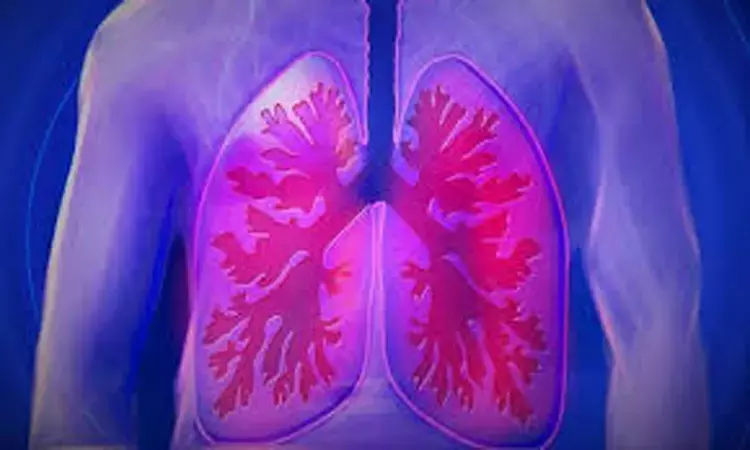- Home
- Medical news & Guidelines
- Anesthesiology
- Cardiology and CTVS
- Critical Care
- Dentistry
- Dermatology
- Diabetes and Endocrinology
- ENT
- Gastroenterology
- Medicine
- Nephrology
- Neurology
- Obstretics-Gynaecology
- Oncology
- Ophthalmology
- Orthopaedics
- Pediatrics-Neonatology
- Psychiatry
- Pulmonology
- Radiology
- Surgery
- Urology
- Laboratory Medicine
- Diet
- Nursing
- Paramedical
- Physiotherapy
- Health news
- Fact Check
- Bone Health Fact Check
- Brain Health Fact Check
- Cancer Related Fact Check
- Child Care Fact Check
- Dental and oral health fact check
- Diabetes and metabolic health fact check
- Diet and Nutrition Fact Check
- Eye and ENT Care Fact Check
- Fitness fact check
- Gut health fact check
- Heart health fact check
- Kidney health fact check
- Medical education fact check
- Men's health fact check
- Respiratory fact check
- Skin and hair care fact check
- Vaccine and Immunization fact check
- Women's health fact check
- AYUSH
- State News
- Andaman and Nicobar Islands
- Andhra Pradesh
- Arunachal Pradesh
- Assam
- Bihar
- Chandigarh
- Chattisgarh
- Dadra and Nagar Haveli
- Daman and Diu
- Delhi
- Goa
- Gujarat
- Haryana
- Himachal Pradesh
- Jammu & Kashmir
- Jharkhand
- Karnataka
- Kerala
- Ladakh
- Lakshadweep
- Madhya Pradesh
- Maharashtra
- Manipur
- Meghalaya
- Mizoram
- Nagaland
- Odisha
- Puducherry
- Punjab
- Rajasthan
- Sikkim
- Tamil Nadu
- Telangana
- Tripura
- Uttar Pradesh
- Uttrakhand
- West Bengal
- Medical Education
- Industry
Captopril linked to more pulmonary events in COVID 19 affected Diabetics

Captopril has been found to be associated with a higher rate of pulmonary adverse reactions in patients with diabetes than that of other ACE inhibitors or angiotensin receptor blockers (ARBs) in a new study. It therefore may not be the best choice for patients with diabetes and COVID-19, researchers suggest.
Captopril is the only currently available ACE inhibitor belonging to the sulfhydryl-containing class and may explain the higher incidence of adverse drug effects observed, according to the researchers.
The outbreak of SARS-CoV-2 in Wuhan China by corona virus family spread as a pandemic in no time. It caused respiratory syndrome in patients with symptoms like fever, dyspnoea, myalgia, and pneumonia leading to increased morbidity and mortality. The mortality rate was more in patients with co morbid conditions like diabetes, hypertension when compared with those who do not have them.
Emma G Stafford et al evaluated the prevalence of pulmonary adverse drug effects (ADEs) in patients with diabetes who were taking Angiotensin converting enzyme inhibitors (ACEI) or Angiotensin II Receptor Blockers (ARBs II) to provide guidance as to how these medications could affect outcomes in acute respiratory illnesses such as SARS-CoV-2 infection. The study was published in the Journal, Journal of the American Pharmacists Association 2020.
The present demographic information reports that 10%-19% of patients hospitalized with COVID-19 in China were diabetic. ACEIs and ARBs are considered first line agents in patients with diabetes because of their nephroprotective effects. Administration of these drugs leads to up-regulation of angiotensin-converting enzyme 2 (ACE2), which is paving way for the viral entry of SARS-CoV-2 virus. Data are lacking as to what pulmonary effects ACEIs or ARBs may have in patients with diabetes, which could be relevant in the management of patients infected with SARS-CoV-2 virus.
To conduct the study, the researchers collected data using '1DATA' which is a unique data platform. 1DATA used an intelligent medicine recommender system called 1DrugAssist which was developed using several national and international databases to evaluate all ADEs reported to the Food and Drug Administration for patients with diabetes taking ACEIs or ARBs.
The key findings of this study were:
Mining of this data elucidated the proportion of a cluster of pulmonary ADEs associated with specific medications in these classes, which may aid health care professionals in understanding how these medications could worsen or predispose patients with diabetes to infections affecting the respiratory system, specifically COVID-19.
Based on this data mining process, captopril was found to have a statistically significantly higher incidence of pulmonary ADEs compared with other ACEIs (P ¼ 0.005) as well as ARBs (P ¼ 0.012), though other specific drugs also had important pulmonary ADEs associated with their use.
The researchers concluded the study saying that, the specific medication's adverse event profile should be considered, particularly captopril, on how it may alter the pulmonary functions in infections like COVID 19.
To read more about the study, click the following link: https://doi.org/10.1016/j.japh.2020.05.018
BDS, MDS
Dr.Niharika Harsha B (BDS,MDS) completed her BDS from Govt Dental College, Hyderabad and MDS from Dr.NTR University of health sciences(Now Kaloji Rao University). She has 4 years of private dental practice and worked for 2 years as Consultant Oral Radiologist at a Dental Imaging Centre in Hyderabad. She worked as Research Assistant and scientific writer in the development of Oral Anti cancer screening device with her seniors. She has a deep intriguing wish in writing highly engaging, captivating and informative medical content for a wider audience. She can be contacted at editorial@medicaldialogues.in.
Dr Kamal Kant Kohli-MBBS, DTCD- a chest specialist with more than 30 years of practice and a flair for writing clinical articles, Dr Kamal Kant Kohli joined Medical Dialogues as a Chief Editor of Medical News. Besides writing articles, as an editor, he proofreads and verifies all the medical content published on Medical Dialogues including those coming from journals, studies,medical conferences,guidelines etc. Email: drkohli@medicaldialogues.in. Contact no. 011-43720751


